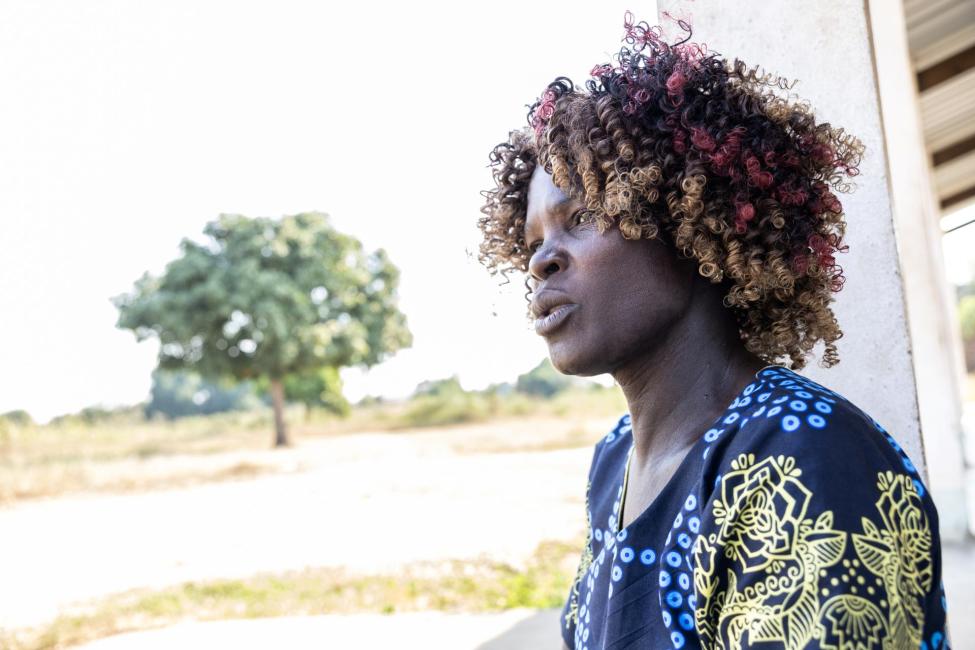-
Who We Are
WHO WE AREThe International Organization for Migration (IOM) is part of the United Nations System as the leading inter-governmental organization promoting since 1951 humane and orderly migration for the benefit of all, with 175 member states and a presence in over 100 countries. IOM has had a presence in Mozambique since 1994.
About
About
IOM Global
IOM Global
-
Our Work
Our WorkAs the leading inter-governmental organization promoting since 1951 humane and orderly migration, IOM plays a key role to support the achievement of the 2030 Agenda through different areas of intervention that connect both humanitarian assistance and sustainable development.
Cross-cutting (Global)
Cross-cutting (Global)
- Data and Resources
- Take Action
- 2030 Agenda
“I usually take one hour to go to the bush, collect firewood and come back,” explains Francisca, an Internally Displaced Person in Sofala Province.
Maputo, 6 December 2023 – The International Organization for Migration (IOM) in partnership with NORCAP and with support from Innovation Norway, have embarked on a groundbreaking initiative to establish a sustainable market for clean energy in displacement settings in Mozambique. This transformative project seeks to address the barriers hindering access to essential energy services for displaced populations while also tackling obstacles faced by private actors in entering this overlooked market.
In areas where people have been forced to leave their homes, the lack of access to electricity and to alternative to traditional cooking fuel, significantly affects the lives of internally displaced persons (IDPs), leading to increased hardship and risks of gender-based violence. The scarcity of traditional cooking fuel forces women to travel long distances to collect firewood, increasing the risks of assault. In addition, inadequate lighting around the area where IDPs live, makes people feel unsafe at night to walk around and use community services, such as markets and communal latrines. This situation poses a threat to the environmental ecosystem and can also lead to strained relationships with host communities due to increased competition for limited resources and a perceived burden on local infrastructure and services.
Despite the humanitarian sector's recognition of sustainable energy access as a priority, according to the State of the Humanitarian Energy Sector Report (2022) approximately 94% of displaced individuals in camps worldwide still lack access to electricity, and 81% rely on firewood and charcoal for cooking. Additionally, basic energy products and services are often provided through humanitarian assistance, potentially disrupting local economies.
Economic barriers have historically hindered displaced populations and host communities from accessing the necessary energy services and perceived risks have discouraged private actors from entering this market and providing viable solutions. This initiative strives to create an enabling environment that allows all stakeholders to actively participate in building a sustainable marketplace for cleaner energy solutions.
In 2022, the project initiated its pilot phase, engaging end users through energy, market, and financial assessments. Co-design workshops with IDPs gathered insights and aspirations, resulting in tailored solutions for the five IDP resettlement sites in Sofala Province, Mozambique, housing around 10,000 individuals. To further inform the project, IOM organized two online Market Dialogue sessions with different stakeholders, including the private sector, for an open exchange of ideas and identification of recurrent challenges in the energy sector. Insights from these sessions formed the basis for a call for proposals for innovative partnerships, inviting potential partners to submit proposals addressing the multi-dimensional challenge of energy access in the resettlement sites.
"IOM’s commitment to durable solutions for displaced populations finds a powerful expression in this project. By addressing the issue of clean energy access, we lay the foundation for sustainable resilience, empowerment, and a brighter and more secure future." Said Dr. Laura Tomm-Bonde, IOM Chief of Mission in Mozambique.
As a result of this call, IOM has partnered with C-Quest Capital and a consortium composed of Green Light Africa, Mercy Corps, and Epsilon Energia Solar. C-Quest Capital will provide training for constructing and maintaining improved cookstoves, combined with a JetFlame kit designed to enhance cooking fuel combustion. Meanwhile, the consortium will introduce solar home systems in the markets and establish a subsidy fund for productive use of energy. The project will also incentivize communities to invest in Village Saving and Loan Associations (VSLAs) which are community based financial solutions that will provide the necessary financial means for families to invest in solar home systems.
Furthermore, IOM and C-Quest Capital are exploring the development of impact metrics to evidence high-integrity, high-impact carbon credits. The intent is to potentially market these credits as a catalyst for the adoption of sustainable energy solutions, fostering a greener future.
IOM envisions developing a global delivery model for best practices, with the ultimate aim of scaling up and replicating this initiative in the future. This innovative approach has the potential to revolutionize access to financing, technology, and capacity building for the private sector and end-users of sustainable energy solutions. By breaking down barriers, inspiring partnerships, and empowering communities, we can collectively usher in a greener, more sustainable future.
"Access to cleaner energy means access to opportunities and a healthier life. With record-high displacement around the world, we need to be faster and more efficient in bringing clean energy to affected communities. The resources and speed required to meet energy needs globally in a climate-friendly manner is only possible by building new approaches and working in partnership with the private sector, civil society, and academia." says Eva Mach, Head of the Environmental Sustainability Unit at IOM.
Lambo Jose, C-Quest Capital Country Manager for Mozambique, explains: “The ‘fogao poupa lenha’ or firewood saver stove was designed for use in deforested areas. In certain communities where we will work, the scarcity of trees forces the community members, especially women, to go on long journeys to gather firewood. Apart from reducing drastically the quantity of wood necessary to cook, another advantage of the ‘fogao poupa lenha’ is its construction using locally available materials such as clay, sand, and manure.”
Watch the video to learn more:




